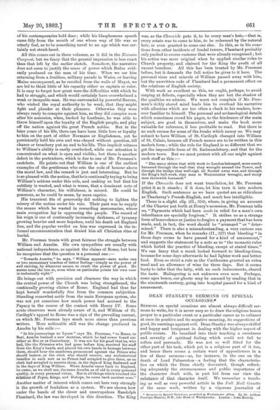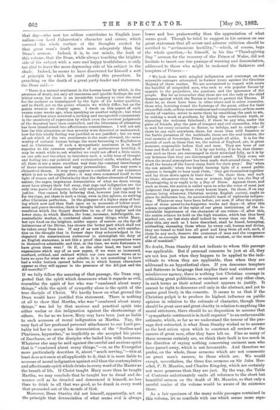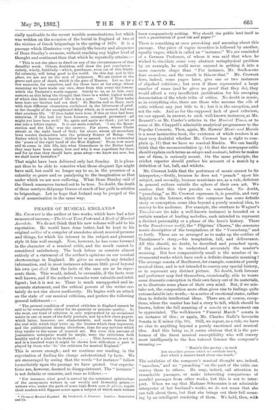DEAN STANLEY'S SERMONS ON SPECIAL OCCASIONS.*
SERMONS on special occasions are almost always difficult ser. mons to write, for it is never easy so to draw the religions lesson proper to a particular event or a particular career as to exhaust at once its positive and its negative meaning, its suggestions of good, its warnings against evil. Dean Stanley was always skilful and happy and benignant in dealing with the higher aspect of public events. He breathed into their teaching a sweetness and serenity of spiritual feeling which could not fail to soften and persuade. He was not so well fitted for the other part of his task, which yet is a religious part of it too, and hence there seems a. certain want of appositeness in a few of these sermons—as, for instance, in the one on the death of Lord Palmerston—a feeling that the characteris- tics on which the Dean chiefly descanted, though reflect- ing adequately the strenuousness and public importance of the character dealt with, in part hid from our view the substance of that character itself. We remember a touch- ing as well as very powerful article in the Pall Mall Gazette of the same week, written by a vigorous journalist of * Sermons on Special Occasions, preached in Westrnitutter Abbey. By Dr. Arthur Penrbyn Stanley, D.D , late Dean of Westminster. London : John Murray-
that day—who now too seldom contributes to English jour- nalism—on Lord Palmerston's character and career, which covered the whole surface of the thoughts excited by that great man's death much more adequately than the Dean's sermon. Indeed, it is, to our minds, the fault of this volume, that the Dean, while always touching the brighter side of his subject with a sure and happy truthfulness, is only too glad to leave the more depressing side of his subject in the shade. Indeed, he seems to have discovered for himself a sort of principle by which he could justify this procedure. In preaching on the death of a great party-leader and statesman, the Dean said :—
" There is a natural sentiment in the human heart by which, in the presence of death, not only all rancorous and ignoble feelings die and wither away, but there is an irresistible tendency to view the dead for the moment as transfigured by the light of his better qualities, and to dwell, not on the points wherein we widely differ, but on the points wherein we closely agree. I dwelt on this aspect of such events some weeks ago, when speaking on another subject ; but what I then said has since received a striking and unexpected commentary in the unanimity of expression by which even the severest judgments of the departed have been controlled, and the bitterness of alienation has been transformed into affectionate remembrance. I will not ask how far this alienation or that severity were deserved or undeserved, how far this kindly feeling was justified or not justified ; but we may all ask which of the two sentiments is the more elevated, the more worthy of rational human beings, the more becoming to Englishmen and to Christians. If such a sympathetic sentiment is in itself superior to the common expression of an acrimonious hostility, it may be worth while to ask whether we could not afford a little more, on one side and the other, to introduce such a noble tone of thought and feeling into our political and ecclesiastical strife, whether, after all, there is not a more excellent way than the constant interchange of fierce recriminations and angry personalities. This may seem a chimerical dream. It may even appear a condition of our existence which is not to be sought after ; it may even commend itself to the light of reason and of Christianity that the darker elements of human nature, the eager, impetuous denunciation of what we deem wrong, must have always their full sway, that rage and indignation are the only true parts of eloquence, the only safeguards of right against in- justice. One cannot help believing that, however just this may be for the time, yet there is such a thing, even in this sphere, as striving after Christian perfection. In the glimpses of a higher state of feel- ing which now and then flash upon us in moments of loftier senti- ment and purer devotion, there is brought before us something of that condition which the Gospel describes to us, of the higher and the lower state, in which Martha, the busy, incessant, indefatigable, un- controllable worker, is cumbered about many things, whilst Mary, her eye fixed on the brighter, nobler aspect of sorrow, on the far-off intimations of the Divine, has chosen the better part which shall not be taken away from her. If any of us now look back with satisfac- tion on the thought that in former days they acknowledged in the -departed the conscientious endeavour to accomplish the duty of an English statesman, is not this a proof that such expressions were in themselves admirable, and that, at the time, we were fortunate to have given them vent ? Or if, on the other hand, we have used expressions which any of us now regret, if we were so immersed, confined, cribbed, and °shined within our own narrow views as to have no eyes for what we now admire, is it not something to have had a wider horizon opened before us, in which human characters appear as they will appear in the presence of the All-just and the All-merciful ?'
If we fully follow the meaning of that passage, the Dean sug- gested that the spirit which denounces what it regards as evil, resembles the spirit of her who was "cumbered about many things," while the spirit of sympathy alone is the spirit of the true disciple of Christ. We hardly know on what ground the Dean would have justified this statement. There is nothing at all to show that Martha, who was " cambered about many things," was led by that anxious and practical spirit into -either undue or doe indignation against the shortcomings of others. So far as we know, Mary may have been just as liable to such accesses of moral indignation as Martha. Nay, the very fact of her profound personal attachment to our Lord pro- bably led her to accept his denunciation of the " Scribes and Pharisees, hypocrites," as implicitly as she accepted his praise of Zacchasus, or of the disciples who hailed him with hosannas. Whatever else may be said against the careful and anxious spirit that is "cumbered about many things,"—or, as the Evangelist more particularly describes it, about " much serving,"—this at least does not seem at all applicable to it, that it is more liable to accesses of moral indignation against evil than the contemplative and affectionate spirit which drinks in every word of the Master as the breath of life. If Christ taught Mary more than he taught Martha, we may conclude that he taught her to dread and de- nounce evil as he dreaded and denounced it himself, no less than to drink in all that was good, as he drank in every word that proceeded out of the month of God.
Moreover, Dean Stanley did not himself, apparently, act on the principle that denunciation of what seems evil is always lower and less praiseworthy than the appreciation of what seems good. Though he tried to suggest in his sermon on one great statesman that all severe and adverse criticism should be ascribed to "acrimonious hostility,"—which, of course, begs the whole question,—he himself, in his fine "Thanksgiving Day " sermon for the recovery of the Prince of Wales, did not hesitate to insert one fine passage of warning and denunciation, addressed to those who might be reckoned the flatterers and tempters of Princes :-
" We look down with mingled indignation and contempt on the miserable outrages attempted in former years against the Gracious Majesty of these realms. We are accustomed to regard with scorn the handful of misguided men, who seek to win popular favour by appeals to the prejudices, the passions, and the ignorance of the people. But let us remember that these are not the only or the chief dangers against which the Nation is bound to protect the Throne. If there be, as there have been in other times and in other countries, those who, hovering round the footsteps of the great, either for their own selfish ends, or from mere weakness and complaisance, or from mere vanity of vanities, strive to serve them by smoothing the path to sin, by making a mock at goodness, by hiding the unwelcome truth, or repeating the welcome falsehood ; if there be any who, under the guise of friends, play the part of tempter and evil counsellor, who lie in wait for every occasion to flatter, to indulge, and to corrupt—if there be any such anywhere, these, far more than wild fanatics or the feeble parasites of the multitude, these are the real traitors, the real enemies of Sovereign, Prince, and people all alike. It is for the growth of such as these that we, the nation of England, are, in great measure, responsible before God and man. They are bone of our bone and flesh of our flesh. It is by our levity, if so be, that charac- ters such as these are encouraged in their wretched folly, as it is by our firmness that they are discouraged and cowed. They come out when the moral atmosphere has been made dark around them, where- in all the beasts of the forest creep forth for their prey.' But when the sun ariseth,' when the bright burning light of a sound public opinion is brought to bear upon them, they get themselves together and lay them down again in their dens.' On these then, and such as these, whosoever they be, men or women, high or low, the Day of Thanksgiving is or ought to be a Day of Doom. Against these, and such as these, the nation is called upon to echo the voice of most just judgment that goes up from every honest heart. On these, if on any human being whatever, Christian society, English society, ought to place its deliberate ban, its unmistakable mark of righteous indigna- tion. Whatever may have been before, yet now, if after the experi- ence of these never-to-be-forgotten weeks and days—if, after this solemn recognition of the value of our great institutions, of the in- calculable importance of the character of our rulers—if, after this, the nation relaxes its hold on the high vocation, which has thus been marked out, our last state shall indeed be worse than our first. If, after this, any such as I have described, shall be found, betraying, misleading, ensnaring those whom by every call, human and divine, they are bound to lead into all good and keep from all evil, such, if there be any such, deserve the contempt of man and the vengeance of God, as amongst the meanest, or the weakest, or the most detest- able of mankind."
No doubt, Dean Stanley did not indicate to whom this passage was applicable. But if personal censures be just at all, they are not less just when they happen to be applied to the indi- viduals to whom they are applicable, than when they are addressed to an hypothetical class. If you denounce tempters and flatterers in language that implies their real existence and mischievous agency, there is nothing but Christian courage in criticising great politicians, or eminent men of any other class, in such terms as their actual conduct appears to justify. It cannot be right to denounce evil only in the abstract, and yet to praise good freely in the concrete. It seems to us that if the Christian pulpit is to produce its highest influence on public opinion in relation to the estimate of character, though there should be great care and great charity in relation to anything like moral strictures, there should be no disposition to assume that " sympathetic sentiment is in itself superior " to an unfavourable estimate, which, so far as we understand the tenour of the pas- sage first extracted, is what Dean Stanley wished us to assume as the best axiom upon which to construct all reviews of the careers Of great men, after they have left us. Fine as many of these sermons certainly are, we think their fault is too much in the direction of saying nothing concerning eminent men who have passed away, which is not favourable. And therefore we prefer, on the whole, those sermons which are not comments on great men's careers, to those which are. We would except, nevertheless, the three fine sermons on Sir John Her- schel, F. D. Maurice, and Charles Kingsley, which are certainly not more generous than they are just. By the way, the Table of Contents unfortunately omits all reference to the short but beautiful sermon on the death of Mr. Maurice, so that only a careful reader of the volume would be aware of its existence there.
As a fair specimen of the many noble passages contained in this volume, let us conclude with one which seems more espe- cially applicable to the recent terrible assassinations, but which was written on the occasion of the burial in England of two of the victims of Greek brigandage in the spring of 1870. It is a passage which illustrates very happily the beauty and eloquence of Dean Stanley's sermons, without reaching any higher level of thought and sentiment than that which he repeatedly attains :-
" This is not the place to dwell on any of the circumstances of that dreadful week. Others, doubtless, will draw the just conclusion— calmly, wisely, faithfully—which, perchance, even out of this fright- ful calamity, will bring good to the world. On this day, and in this place, we are not on the seat of judgment. We are rather at the grave and gate of death, which is the gate of Heaven. Let ns, for a few moments, for ourselves, and for those here or far away, whose mourning we have made our own, draw from this event the lessons which the Psalmist's words suggest. Surely to us, as to him, such sorrows as this bring the thought that there is a wider, higher world, of which this little round of life is but a part. Lord, if Then hadst been here ray brother had not died.' So Martha and so Mary, each with their different characters, exclaimed in the bitterness of grief, at the thought of the unexplained delay which, as it seemed, had coat that precious life. ' If thou hadst been here, if this or that had been otherwise, if this had but been foreseen, arranged, prevented—all might yet have been well.' So, again and again we think ; yet let us rise into a loftier region. It is our main comfort. I am the Resur- rection and the Life,' was the answer. Far above, where Christ sitteth at the right hand of God; far above, where all secondary laws resolve themselves into the primary Source of Being, Our Father which is in heaven ;' thither let us ascend. Let us remember the years of the right hand of the Most Highest: From how much evil to come in this life, into what blessedness in the Better Land, they may have been taken, how and why it was expedient for them and for us that they should have gone away—we know not now, but we shall know hereafter."
That might have been delivered only last Sunday. It is pleas- ant thus to be able to conceive what those eloquent lips might have said, but could no longer say to us, in the presence of a calamity so grave and so paralysing to the imagination as that tinder which we are now suffering. What Dean Stanley said of the Greek massacres turned out to be true. No doubt, the death of those martyrs did purge Greece of much of her guilt in relation to brigandage. Let us hope that Ireland may be purged of the sin of assassination in the same way.


































 Previous page
Previous page